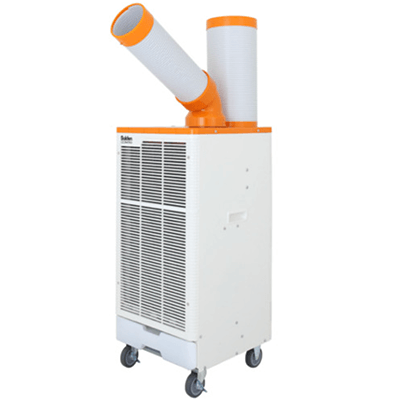What Is a Spot Cooler?

A spot cooler is a localized air conditioning device that cools air internally and delivers it as focused airflow. Known also as a cooling fan or portable cooler, it differs from conventional air conditioners by targeting specific zones for cooling, offering energy savings and easy installation without construction work. Spot coolers come in various sizes for both domestic and commercial use. Domestic models are compact and versatile, operating on standard 100V household outlets. Commercial models, operating at 200V, provide greater cooling capacity, making them suitable for use in larger spaces like factories or outdoors.
Uses of Spot Cooler
Spot coolers are ideal for areas where traditional air conditioning is impractical or too costly. They are widely used in factories, warehouses, assembly lines, and commercial kitchens, providing localized cooling for workers or specific areas. These coolers are also useful in domestic settings for targeted cooling in garages, pet areas, or during specific activities like cooking or ironing. They can enhance comfort in various scenarios, from factory floors to outdoor events.
Structure of Spot Cooler
Similar to small air conditioners, spot coolers have heat exchangers and compressors. They intake air, cool it, and release it from the front, while expelling hot air from the back. This design focuses cooling on a narrow area, making spot coolers less suitable for large, sealed spaces. They collect water in a tank, requiring disposal when full. Regular filter cleaning is necessary to maintain efficiency.
Types of Spot Coolers
Spot coolers come with additional functionalities like dehumidification, heating, and clothes drying. Multifunctional models can be used throughout the year, providing versatility compared to seasonal appliances. Their portable design allows for reuse in different spaces, offering practicality over multiple fixed air conditioners.
How to Choose a Spot Cooler
When choosing a spot cooler, consider its suitability for open spaces, as they can increase room temperature in enclosed areas. Rain-resistant models are beneficial for outdoor use. Noise level is also a crucial factor, with domestic models averaging around 50dB. Evaporative coolers, using water’s latent heat, offer an eco-friendly alternative with lower noise and power consumption, though they provide different cooling effects compared to traditional spot coolers.